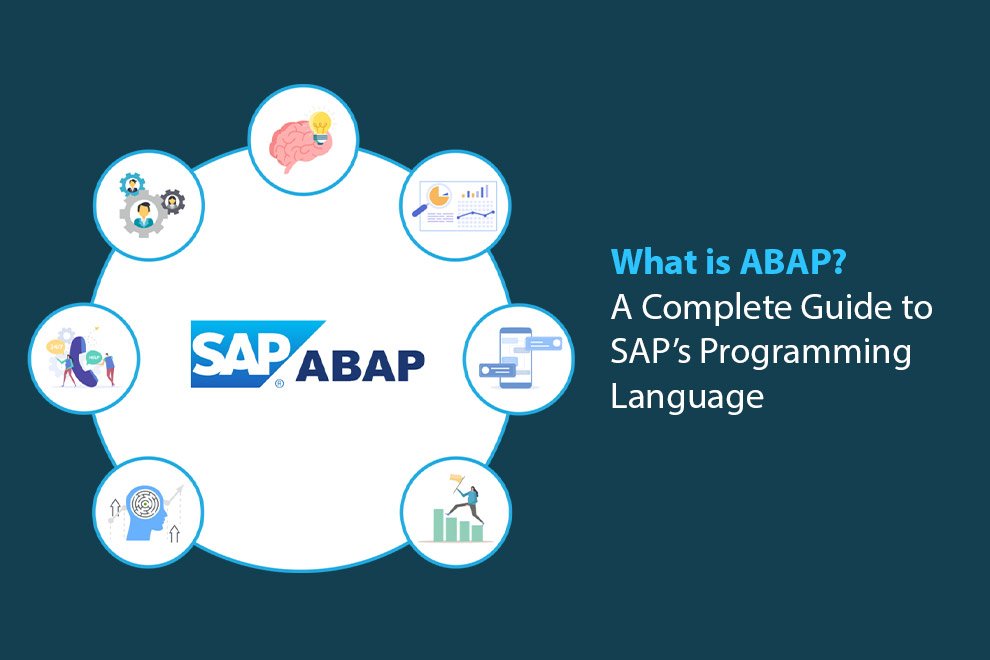In the vast world of enterprise software, one name stands tall: SAP. It’s the engine that powers many of the world’s largest and most successful businesses, handling everything from finance and logistics to human resources and customer relations. But what makes this powerful system tick? The answer lies in a special programming language developed specifically for this ecosystem: ABAP.
If you’ve ever wondered how SAP systems are customized, extended, and maintained, then you’ve come to the right place. This guide will demystify ABAP, explaining what it is, why it’s important, and who uses it.
What Exactly is ABAP?
ABAP, which stands for Advanced Business Application Programming, is a high-level programming language created by SAP. Think of it as the “native language” of the SAP ecosystem. While other languages might be used to interact with SAP systems, ABAP is the core language used to build and modify applications directly on the SAP platform.
Originally developed in the 1980s, ABAP has evolved significantly over the decades. It started as a procedural language for creating simple reports but has since grown into a modern, object-oriented language capable of developing complex, large-scale enterprise applications.
Why is ABAP So Important? The Power of Customization
No two businesses are exactly alike. While SAP provides a powerful, standardized suite of applications, almost every company needs to customize it to fit their unique processes and requirements. This is where ABAP’s true power lies.
With ABAP, developers can:
- Create Custom Reports: Generate detailed reports that are tailored to a company’s specific needs, going beyond the standard reports offered by SAP.
- Develop Custom Applications: Build entirely new applications that run within the SAP environment to handle unique business processes.
- Enhance Existing Functionality: Add new features or modify the behavior of standard SAP applications using various enhancement techniques.
- Build Interfaces: Create interfaces that allow SAP systems to communicate with other non-SAP systems, ensuring seamless data flow across the entire enterprise.
- Develop Custom Workflows: Automate complex business processes, such as approval workflows for purchase orders or invoices.
In essence, ABAP is the key that unlocks the full potential of an SAP system, allowing businesses to mold it into a solution that perfectly matches their operational needs.
Who Uses ABAP? The Role of the ABAP Developer
An ABAP Developer (or ABAPer) is a specialized software developer who uses the ABAP language to customize and develop applications within the SAP environment. They work closely with functional consultants (who understand the business processes) to translate business requirements into technical solutions.
The role is challenging and requires a unique blend of skills:
- Strong Programming Logic: A solid understanding of programming fundamentals.
- ABAP Language Proficiency: Deep knowledge of ABAP syntax, keywords, and development tools.
- SAP Module Knowledge: Familiarity with the specific SAP modules they are working on (e.g., FI/CO for finance, SD for sales, MM for materials).
- Debugging and Problem-Solving Skills: The ability to troubleshoot complex issues within a large, integrated system.
For those looking to build a career in this stable and rewarding field, a structured learning path is essential. Enrolling in a high-quality SAP ABAP Course is the most effective way to gain the foundational knowledge and hands-on experience needed to become a proficient ABAP developer.
The Evolution of ABAP: From Classic to Cloud
The world of technology is always changing, and ABAP is no exception. While “classic” ABAP is still widely used for on-premise SAP systems, SAP has introduced new versions of ABAP to support its modern platforms:
- ABAP for SAP HANA: This version is optimized to take advantage of the speed and power of the SAP HANA in-memory database, allowing for much faster data processing.
- RESTful ABAP Programming Model (RAP): A modern framework for building cloud-ready, Fiori-based applications on the SAP Business Technology Platform (BTP).
This evolution means that the demand for skilled ABAP developers continues to be strong, especially for those who keep their skills updated with the latest technologies.
Getting Started with ABAP: Your Learning Journey
A career as an ABAP developer can be incredibly stable and lucrative, given SAP’s massive footprint in the enterprise world. For individuals in tech hubs looking to gain a competitive edge, finding localized, expert-led training is key. Pursuing a certification through a reputable provider of SAP ABAP Training in Hyderabad, for example, can provide you with the hands-on practice and industry connections needed to launch a successful career in the SAP ecosystem.
Conclusion: The Language of Modern Business
ABAP is more than just a programming language; it’s the backbone of customization for the world’s leading enterprise software. It’s a robust, evolving, and highly in-demand skill that empowers businesses to tailor their SAP systems to perfection. For developers who enjoy solving complex business problems and working within a powerful, structured environment, a career in ABAP offers a direct path to becoming an indispensable part of the modern business landscape.
Also Read: Python Certifications to Accelerate Your Programming Journey










